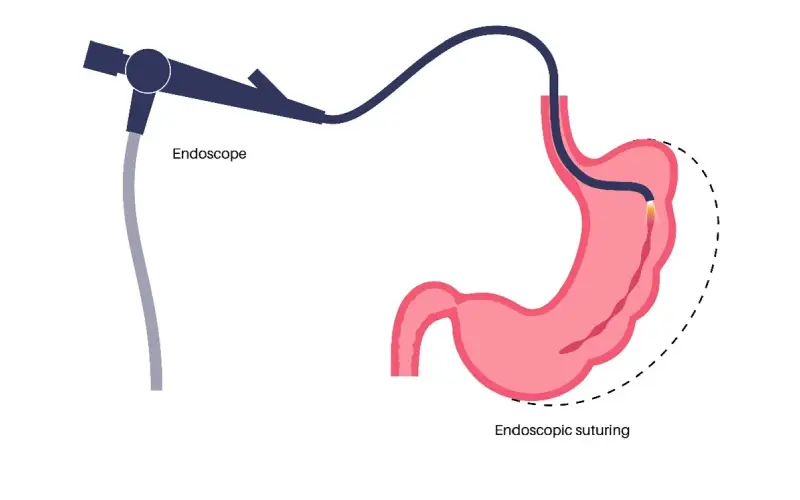New research led by Reem Z. Sharaiha, MD, MSc, director of interventional endoscopy at NewYork-Presbyterian and Weill Cornell Medicine, shows that the DiaRem (Diabetes Remission post-Roux-en-Y gastric bypass) score can be used to reliably predict remission from type 2 diabetes mellitus one year after undergoing endoscopic sleeve gastroplasty (ESG).
There is already strong evidence that surgeries like ESG can achieve significant weight loss, but tools are needed to help predict whether patients will also experience improvements in comorbidities such as diabetes, liver disease, and heart disease.
Projections indicate that by 2030, nearly half of Americans will have obesity, and about a third of them will develop type 2 diabetes.
— Dr. Reem Sharaiha
Below, Dr. Sharaiha shares results from the retrospective study that evaluated the predictive value of the DiaRem score among a cohort of patients with type 2 diabetes who had undergone ESG and how these findings could impact patient selection for surgery and future insurance coverage for the procedure.
Role of Weight Loss Surgery
Obesity is one of the most pressing challenges facing the U.S. healthcare system, with considerable clinical and economic consequences. Projections indicate that by 2030, nearly half of Americans will have obesity, and about a third of them will develop type 2 diabetes. In addition to becoming insulin-dependent, individuals with diabetes face an increased risk of stroke, heart attack, and other comorbidities. When it comes to weight loss treatment, surgery remains the gold standard.

It is predicted that by 2030, nearly half of Americans will have obesity, and about one-third will develop type 2 diabetes.
At NewYork-Presbyterian and Weill Cornell Medicine, we have been performing ESG since 2013, making us one of the first centers to offer this less invasive weight loss procedure, which enables patients to return home the same day and achieve an average of 15% total body weight loss. Roux-en-Y gastric bypass and sleeve gastrectomy have been demonstrated in multiple randomized controlled trials to not only result in substantial weight loss but also achieve diabetes remission rates of 30% at five years. This provides an excellent option for patients seeking alternatives to lifelong medications for weight loss or diabetes management.
Key Findings
In this study, our goal was to determine whether we could reliably predict which patients undergoing ESG would experience improvements in their comorbidities, particularly diabetes remission. Since there are currently no predictive tools specifically for ESG, we tested the DiaRem score, a predictive model originally developed for Roux-en-Y gastric bypass. The DiaRem score ranges from 0 to 22 points and is based on factors such as age, use of diabetes medications, insulin administration, and hemoglobin A1C levels. A score of 10 or less suggests a likelihood of diabetes remission following weight loss surgery.

The DiaRem score was reliable in predicting diabetes remission with 100% sensitivity and 58.3% specificity in patients who had undergone an endoscopic sleeve gastroplasty. The study sought to determine whether the DiaRem score could be used to reliable predict which patients undergoing ESG would experience diabetes remission.
We evaluated a retrospective cohort of 39 patients with type 2 diabetes who underwent ESG. These patients had an elevated hemoglobin A1C, with about 13% requiring insulin and 44% taking diabetes medication. At one year after ESG, nearly 70% of these patients experienced diabetes remission and had a median total body weight loss of 12.7%. The DiaRem score was reliable in predicting remission with 100% sensitivity and 58.3% specificity at the optimal cutoff score of 10.
This tool enables us to better categorize patients before surgery or bariatric endoscopy and to counsel them on the likelihood of achieving diabetes improvement and becoming medication-free after their procedure.
— Dr. Reem Sharaiha
Personalized Decision Making and Insurance Coverage
This tool enables us to better categorize patients before surgery or bariatric endoscopy and to counsel them on the likelihood of achieving diabetes improvement and becoming medication-free after their procedure. This can be especially valuable for patients who are uncertain about undergoing surgery or the endoscopic sleeve, and are considering other options, such as GLP-1 weight loss injectables. It also has significant implications for insurance coverage of ESG. I am optimistic that the ability to predict which patients will achieve diabetes remission will present a strong case for cost-effectiveness to insurers, ultimately improving access to this procedure.
Future Research
Bariatric endoscopy is a rapidly advancing field. At our center, we are currently analyzing long-term data on ESG and will soon be publishing 10-year outcomes. Our initial findings have shown sustained weight loss and improvements in associated comorbidities. We are also examining how ESG affects other obesity-related comorbidities, such as cardiovascular and liver diseases. Overall, we believe this data supports the role of ESG as a valuable option for improving the health of patients with obesity. Additionally, we are conducting several FDA studies on various endoscopic devices aimed at treating diabetes.




